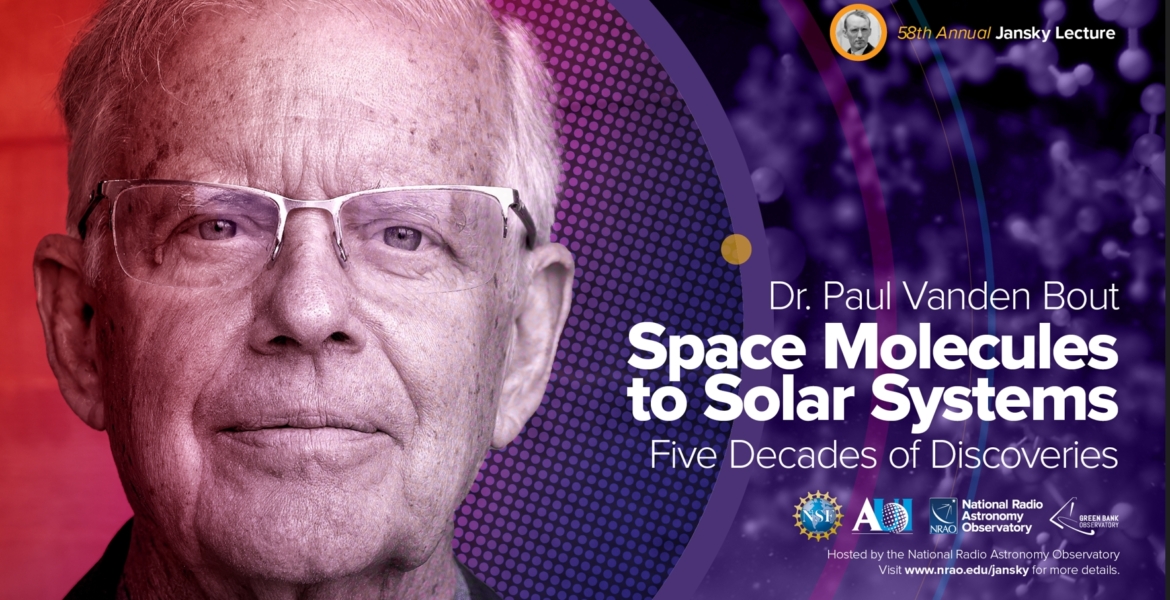Astronomers using the Atacama Large Millimeter/submillimeter Array (ALMA) and NASA’s James Webb Space Telescope (JWST) have discovered that some of the most massive stars in our galaxy are emitting unbelievably tiny grains of carbon dust—dust that one day could form future stars and planets.
Recent News
ALMA Creates Largest-Ever Image of the Milky Way’s Core
The new survey—known as the ALMA CMZ Exploration Survey (ACES)—maps more than 650 light-years across the Central Molecular Zone, the extreme environment that surrounds our galaxy’s supermassive black hole.
Mission Patagonia Welcomes Its 2026 Nature Guardians
A small cohort of educators, scientists and environmental leaders will embark March 3-14 to the southern edge of the world for Mission Patagonia, an immersive outdoor environmental education experience designed to foster deep connection to place, people and planet.
Paul A. Vanden Bout awarded the 2023 Karl G. Jansky Lectureship

Credit: NRAO/AUI/NSF
Associated Universities, Inc. (AUI) and the National Radio Astronomy Observatory (NRAO) have awarded the 2023 Karl G. Jansky Lectureship to Dr. Paul A. Vanden Bout, Senior Scientist, Emeritus at NRAO. The Jansky Lectureship is an honor established by the trustees of AUI to recognize outstanding contributions to the advancement of radio astronomy.
After earning his Ph.D. from the University of California, Berkeley, Dr. Vanden Bout pioneered work in millimeter-wavelength astronomy at McDonald Observatory. He was the Director of NRAO from 1985 to 2002, and oversaw the completion of the Very Long Baseline Array, Green Bank Telescope, Expanded Very Large Array, now the Jansky Very Large Array, and the start of the Atacama Large Millimeter/submillimeter Array (ALMA). He was Interim Director of ALMA from 2002 – 2003, and Interim Head of the North American ALMA Science Center from 2004 – 2005. ALMA is one of the largest astronomical projects in the world, a complex array of 66 radio telescopes located high in the Chilean desert. One of the biggest challenges was simply ensuring ALMA was successful. “Every big project has funding difficulties and touch-and-go situations. ALMA was no exception,” Dr. Vanden Bout said. Beyond his service as NRAO Director, Dr. Vanden Bout has published nearly 100 research articles. He is also the first author of “The ALMA Telescope: The Story of a Science Mega-Project,” published by Cambridge University Press in Fall 2023.
Dr. Vanden Bout will deliver his Jansky Lecture, entitled “Millimeter Astronomy at NRAO – Some Personal Remembrances, “ in Charlottesville, VA on Wednesday November 8; at the Green Bank Observatory in Green Bank, WV on Thursday November 9; and in Socorro, NM on Friday November 17. Learn more about these event times and locations.
First awarded in 1966, the Jansky Lectureship is named in honor of the man who, in 1932, first detected radio waves from a cosmic source. Karl Jansky’s discovery of radio waves from the central region of the Milky Way started the science of radio astronomy.
Other recipients of the Jansky award include eight Nobel laureates (Drs. Subrahmanyan Chandrasekhar, Edward Purcell, Charles Townes, Arno Penzias, Robert Wilson, William Fowler, Joseph Taylor, and Reinhard Genzel) as well as Jocelyn Bell-Burnell, discoverer of the first pulsar, and Vera Rubin, discoverer of dark matter in galaxies.
See a list of past recipients.
The National Radio Astronomy Observatory and the Green Bank Observatory are facilities of the National Science Foundation, operated under cooperative agreement by Associated Universities, Inc.
This news article was originally published on NRAO website on October 12, 2023.
Recent News
A Quintillion-to-One: Giant Stars, Tiny Dust
Astronomers using the Atacama Large Millimeter/submillimeter Array (ALMA) and NASA’s James Webb Space Telescope (JWST) have discovered that some of the most massive stars in our galaxy are emitting unbelievably tiny grains of carbon dust—dust that one day could form future stars and planets.
ALMA Creates Largest-Ever Image of the Milky Way’s Core
The new survey—known as the ALMA CMZ Exploration Survey (ACES)—maps more than 650 light-years across the Central Molecular Zone, the extreme environment that surrounds our galaxy’s supermassive black hole.
Mission Patagonia Welcomes Its 2026 Nature Guardians
A small cohort of educators, scientists and environmental leaders will embark March 3-14 to the southern edge of the world for Mission Patagonia, an immersive outdoor environmental education experience designed to foster deep connection to place, people and planet.
